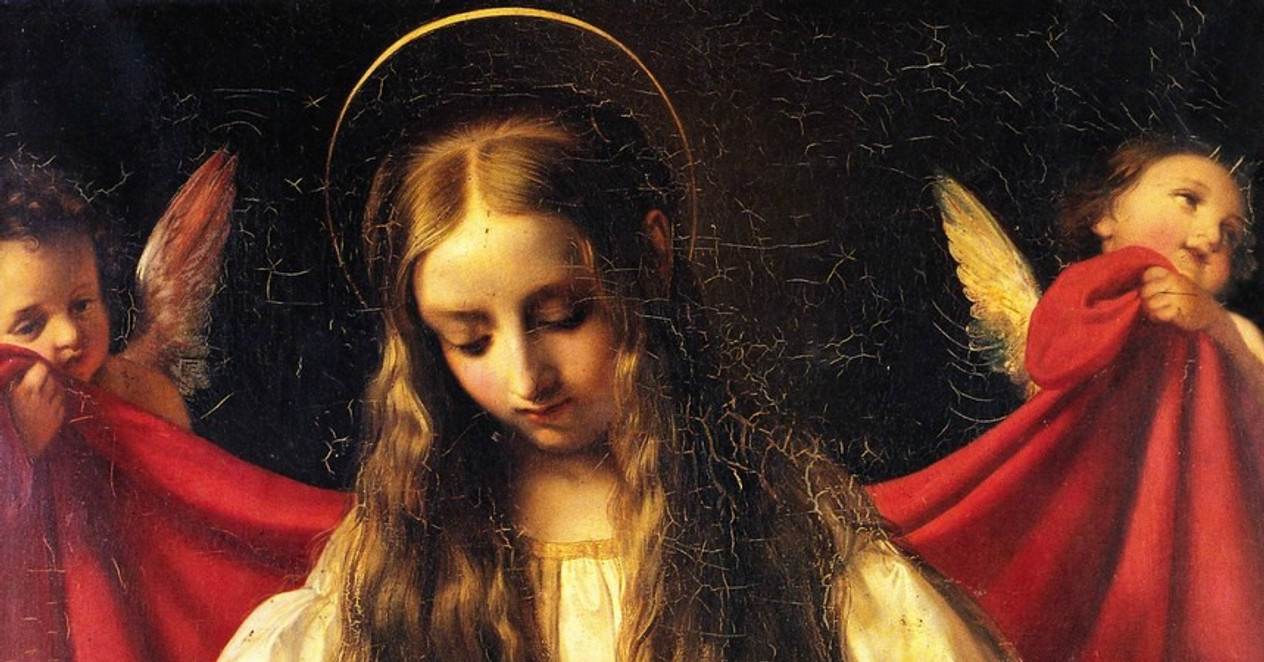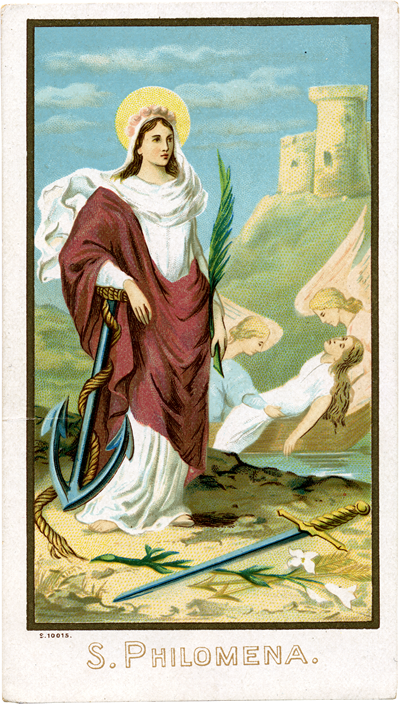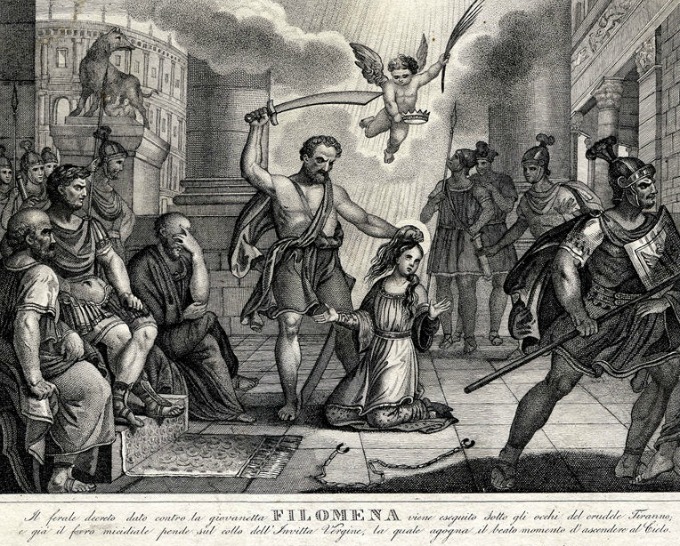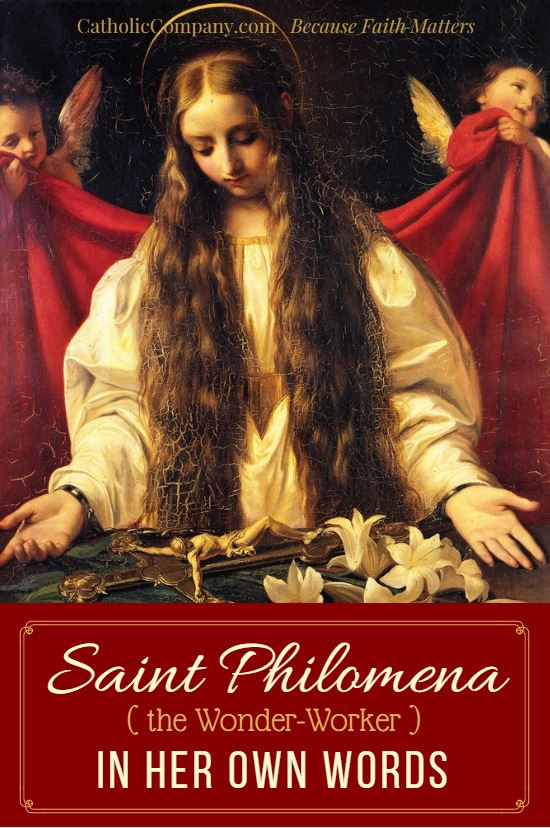St. Philomena the Wonder-Worker: Her Story in Her Own Words
Aug 10, 2016 by Genevieve Cunningham
Knowledge of Saint Philomena seems to be steadily growing. Catholics around the world are discovering her and becoming fervently devoted. Her beautiful name is familiar on their lips.
But this is quite a recent development.
Saint Philomena was martyred under the reign of Diocletian around 300 A.D. For more than fifteen hundred years, she became an unknown martyr, joining the numbers of beautiful but nameless souls who had died for Christ.
But it seems that Jesus wanted to share her with the world.
The Discovery of A Forgotten Saint
In 1802, a worker’s pickax struck the surface of a tomb in the darkness of an underground cemetery, within the catacombs of Priscilla. A Vatican overseer was notified and came with several other witnesses. Sand was cleared away; the tomb of a martyr was unearthed. Three funeral tiles bore the words PAX TECUM FILUMENA. [Peace be with you, Philomena] The letters were painted in a vermilion-red lead and were still easily legible.

When competent authorities examined the remains found within, they discovered them to be the bones of a young woman between the ages of thirteen and fifteen.
With due reverence, the remains were taken to the treasury of Sacred Relics, and placed with care; but nothing at all was known about the saint, and it seemed that this would always be the case. How could anything more be discovered about a young woman who had died 1,500 years ago?
But Philomena’s legacy had just begun.
Philomena Shares Her Story
Some years after her relics were discovered, the saint revealed her story to three different people. These three people had never met each other, lived in different places around the world, and yet reported accounts of Philomena’s life that were eerily identical.
The best-known account was given to Venerable Mother Maria Luisa di Gesù, a Dominican tertiary. In August of 1833, Mother Luisa was praying before a statue of Saint Philomena, and felt a keen desire to know the details of Philomena’s life and martyrdom. Later, when she was in her cell, her prayerful desire was granted. The gentle voice of Philomena spoke to her.
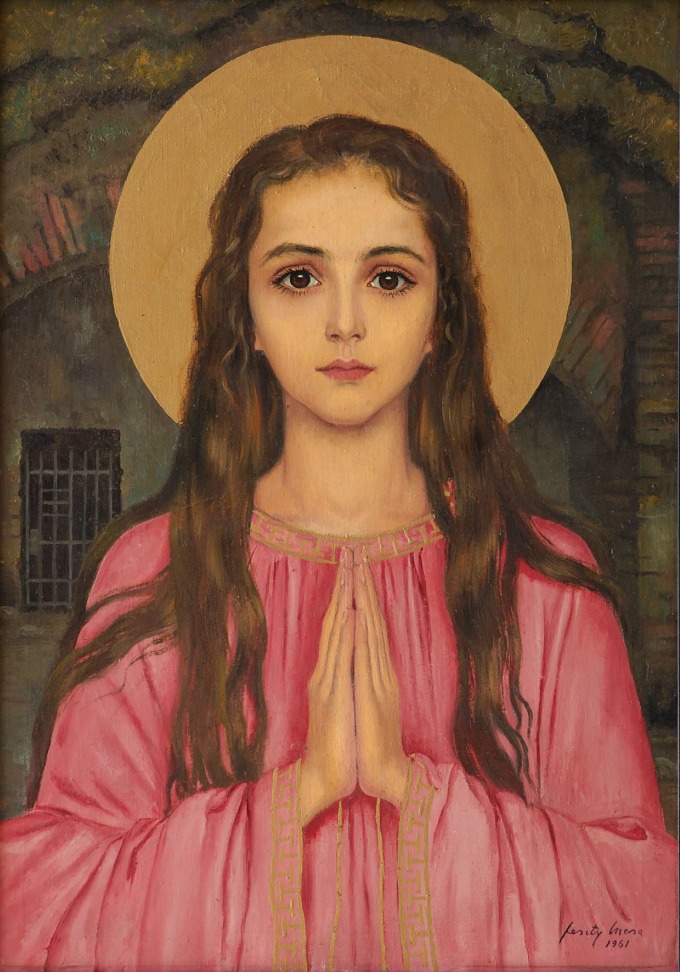
So here is the story of this lovely saint, told in her own words.
"My dear Sister, I am the daughter of a Prince who governed a small state in Greece. My mother is also of royal blood. My parents were without children. They were idolaters. They continually offered sacrifices and prayers to their false gods.
A doctor from Rome named Publius lived in the palace in the service of my father. This doctor professed Christianity. Seeing the affliction of my parents, by the impulse of the Holy Ghost, he spoke to them of Christianity, and promised to pray for them if they consented to receive Baptism. The grace which accompanied his words enlightened their understanding and triumphed over their will. They became Christians and obtained the long desired happiness that Publius had assured them as the reward of their conversion. At the moment of my birth, they gave me the name of "Lumena," an allusion to the light of Faith of which I had been, as it were, the fruit. The day of my Baptism they called me "Filumena," or "Daughter of Light," because on that day I was born to the Faith. The affection which my parents bore me was so great that they had me always with them.
It was on this account that they took me to Rome on a journey that my father was obliged to make on the occasion of an unjust war with which he was threatened by the haughty Diocletian. I was then thirteen years old. On our arrival in the capital of the world, we proceeded to the palace of the Emperor and were admitted for an audience. As soon as Diocletian saw me, his eyes were fixed upon me. He appeared to be pre-possessed in this manner during the entire time that my father was stating with animated feelings everything that could serve for his defense.
As soon as Father had ceased to speak, the Emperor desired him to be disturbed no longer, to banish all fear, to think only of living in happiness. These are the Emperor’s words, ‘I shall place at your disposal all the force of the Empire. I ask only one thing, that is the hand of your daughter.’ My father, dazzled with an honor he was far from expecting, willingly acceded on the spot to the proposal of the Emperor.
When we returned to our own dwelling, Father and Mother did all they could to induce me to yield to Diocletian’s wishes and theirs. I cried, ‘Do you wish, that for the love of a man, I should break the promise I have made to Jesus Christ? My virginity belongs to him. I can no longer dispose of it.’
‘But you were young then, too young,’ answered my father, ‘to have formed such an engagement.’ He joined the most terrible threats to the command that he gave me to accept the hand of Diocletian. The grace of my God rendered me invincible, and my father, not being able to make the Emperor relent, in order to disengage himself from the promise he had given, was obliged by Diocletian to bring me to the Imperial Chamber.
I had to withstand for some time beforehand a new attack from my father’s anger. My mother, uniting her efforts to his, endeavored to conquer my resolution. Caresses, threats, everything was employed to induce me to compliance. At last, I saw both of my parents fall at my knees and say to me with tears in their eyes, ‘My child have pity on your father, your mother, your country, our country, our subjects.’
‘No! No,’ I answered them. ‘My virginity, which I have vowed to God, comes before everything, before you, before my country. My kingdom is heaven.’
My words plunged them into despair and they brought me before the Emperor, who on his part did all in his power to win me. But his promises, his allurements, his threats, were equally useless. He then flew into a violent fit of anger and, influenced by the Devil, had me cast into one of the prisons of the palace, where he had me loaded with chains. Thinking that pain and shame would weaken the courage with which my Divine Spouse inspired me, he came to see me every day. After several days, the Emperor issued an order for my chains to be loosed, that I might take a small portion of bread and water. He renewed his attacks, some of which would have been fatal to purity had it not been for the grace of God.
The defeats which he always experienced were for me the preludes to new tortures. Prayer supported me. I did not cease to recommend myself to Jesus and his most pure Mother. My captivity had lasted thirty-seven days, when, in the midst of a heavenly light, I saw Mary holding the Divine Son in her arms.
‘My daughter,’ she said to me, ‘three days more of prison and after forty days you shall leave this state of pain.’

Such happy news made my heart beat with joy, but as the Queen of Angels had added that I should quit my prison, to sustain, in frightful torments a combat far more terrible than those preceding, I fell instantly from joy to the most cruel anguish; I thought it would kill me.
‘Have courage, my child,’ Mary then said to me; ‘are you unaware of the love of predilection that I bear for you? The name, which you received in baptism, is the pledge of it for the resemblance which it has to that of my Son and to mine. You are called Lumena, as your Spouse is called Light, Star, Sun, as I myself am called Aurora, Star, the Moon in the fullness of its brightness, and Sun. Fear not, I will aid you. Now nature, whose weakness humbles you, asserts its law. In the moment of combat, grace will come to lend you its force, and your Angel, who was also mine, Gabriel, whose name expresses strength, will come to your aid. I will recommend you especially to his care, as the well beloved among my children.’
These words of the Queen of virgins gave me courage again, and the vision disappeared, leaving my prison filled with a celestial perfume. I experienced a joy out of this world. Something indefinable.
What the Queen of Angels had prepared me for was soon experienced. Diocletian, despairing of bending me, decided on public chastisement to offend my virtue. He condemned me to be stripped and scourged like the Spouse I preferred to him. These are his horrifying words.
‘Since she is not ashamed to prefer to an Emperor like me, a malefactor condemned to an infamous death by his own people, she deserves that my justice shall treat her as he was treated.’
The prison guards hesitated to unclothe me entirely but they did tie me to a column in the presence of the great men of the court. They lashed me with violence until I was bathed in blood. My whole body felt like one open wound, but I did not faint.
The tyrant had me dragged back to the dungeon, expecting me to die. I hoped to join my heavenly Spouse. Two angels, shining with light, appeared to me in the darkness. They poured a soothing balm on my wounds, bestowing on me a vigor I did not have before the torture.
When the Emperor was informed by the change that had come over me, he had me brought before him. He viewed me with a greedy desire and tried to persuade me that I owed my healing and regained vigor to Jupiter, another god that he, the Emperor, had sent to me. He attempted to impress me with his belief that Jupiter desired me to be Empress of Rome. Joining to these seductive words promises of great honor, including the most flattering words, Diocletian tried to caress me. Fiendishly, he attempted to complete the work of Hell which he had begun. The Divine Spirit to whom I am indebted for constancy in preserving my purity seemed to fill me with light and knowledge and to all the proofs which I gave of the solidity of our Faith, neither Diocletian nor his courtiers could find an answer.
Then, the frenzied Emperor dashed at me, commanding a guard to chain an anchor around my neck and bury me deep in the waters of the Tiber. The order was executed. I was cast into the water, but God sent me two angels who unfastened the anchor. It fell into the river mud, where it remains no doubt to the present time. The angels transported me gently in full view of the multitude upon the riverbank. I came back unharmed, not even wet, after being plunged with the heavy anchor.
When a cry of joy rose from the debauchers on the shore, and so many embraced Christianity by proclaiming their belief in my God, Diocletian attributed my preservation to secret magic. Then the Emperor had me dragged through the streets of Rome and shot with a shower of arrows. My blood flowed, but I did not faint. Diocletian thought that I was dying and commanded the guards to carry me back to the dungeon. Heaven honored me with a new favor there. I fell into a sweet sleep, and I found myself, on awaking, perfectly cured.
Diocletian learned about it. ‘Well, then,’ he cried in a fit of rage, ‘let her be pierced with sharp darts a second time, and let her die in that torture.’ They hastened to obey him. Again, the archers bent their bows. They gathered all their strength, but the arrows refused to second their intentions. The Emperor was present. In a rage, he called me a magician, and thinking that the action of fire could destroy the enchantment, ordered the darts to be made in a furnace and directed against my heart. He was obeyed, but these darts, after having passed through a part of the space which they were to cross to come to me, took a quite contrary direction and returned to strike those by whom they had been hurled. Six of the archers were killed by them. Several among them renounced paganism, and the people began to render public testimony to the power of God that protected me.
These murmurs and acclamations infuriated the tyrant. He determined to hasten my death by ordering my head to be cut off. My soul took flight towards my heavenly Spouse, who placed me, with the crown of virginity and the palm of martyrdom, in a distinguished place among the elect. The day that was so happy for me and saw me enter into glory was Friday, the third hour after mid-day, the same hour that saw my Divine Master expire."
Saints Who Loved This Saint
There are many saints who were deeply devoted to Philomena. They sought out her intercession, had great trust in her desire to help them, and spread devotion to her among the people around them. Here are several of those saints:
Saint John Vianney
Padre Pio
Saint Frances Cabrini
Saint Damien of Molokai
Saint John Neumann
Saint Peter Julian Eymard
Blessed Anna Maria Taigi
There is even a Saint Philomena Scapular as well as a Saint Philomena Chaplet that you can pray.
Sometimes, Saint Philomena chooses people herself! That is, she definitely seems to have chosen my younger brother Liam. He first happened to read a brief pamphlet about her that was placed in a local parish when he was a very young teen. He did not seek her out after that, but she kept popping into his life.
For example, while visiting a shrine's gift shop, he plunged his hand into a bin full of medals and picked one at random. It was a Saint Philomena medal. Things like this have happened to him more than once.
One year, on his birthday, my mom asked him what he wanted for his birthday. He requested a book about Saint Philomena. (My mom was delighted but surprised that a teenage boy would ask for something like that.) Even more amazing—my brother decided to choose her as his confirmation saint! He was a little embarrassed, at first, to have a girl's name for his saint. But his devotion to her overcame his hesitance.
Regarding the Controversy Surrounding St. Philomena
St. Philomena's feast day was removed from the official liturgical calendar in the 1960s during the liturgical reforms of Pope John XXIII. This was due to the lack of verifiable historical evidence surrounding her existence, the fact that her miracles were not formally approved in the usual process, and that she was never officially declared a saint in the usual manner when her tomb was discovered in the 19th century.
This has led some to conclude that Philomena is not really a saint, and that it is wrong for Catholics to persist in venerating her as such—considering that she was removed from the liturgical calendar by the Sacred Congregation of Rites due to lack of credibility.
Indeed, St. Philomena's case is unusual. She was unknown in Church history until her tomb was discovered in modern times, after which miracles attributed to her intercession abounded. The papal response to the discovery of the relics and the resulting miracles (at least one of which was known personally to the Holy Father) was that Pope Gregory XVI, by papal decree, added her feast day to the liturgical calendar. This decree was based on her miracles alone, despite the lack of knowledge about her life and the absence of known veneration by previous generations of Christians.
At the time her body was discovered, there was not yet a canonization process by which miracles were painstakingly investigated as they are today—but the Holy Father gave approval to her public liturgical veneration with a Mass and a Divine Office, which is an acknowledgment of her heavenly status. This stands in place of the typical canonization procedure. It is indeed an irregular situation (likely based on the unusual way in which Philomena was discovered), however it is lawful for a pope to canonize a saint based on the fame of miracles alone apart from the usual procedure. Papal canonization is protected from error by the Holy Spirit. We can therefore say that Philomena is Saint Philomena.
She was not only given a feast day, however; she was also given an archconfraternity which was raised to a universal archconfraternity by papal decree. (Put simply, an archconfraternity is an association of Catholic faithful that ascribes to and promotes a particular devotion thereby enjoying certain privileges and graces.)
Although Philomena's feast was removed from the liturgical calendar, it does not follow that her veneration is forbidden; her archconfraternity and universal shrine still exist with papal approval, just as they have since their founding.
According to the Universal Archconfraternity of Saint Philomena:
From the liturgical approval of Pope Gregory XVI to the papal decrees of St. Pius X, Nineteen acts of the Holy See in the course of five successive pontificates were issued in positive promotion of popular devotion to Saint Philomena expressed in the form of elevations in rank of liturgical cultus, the erection of confraternities and archconfraternities, and the granting of plenary and partial indulgences."
Although the Church has removed her feast from the modern liturgical calendar, Pope Pius X declared that Philomena's veneration as a saint is part of the infallible Magisterium. You can read more detailed evidence for the lawful veneration of St. Philomena here.
Her Patronage
Saint Philomena is the patron saint of priests, youth (especially babies and children), the afflicted and imprisoned, the suffering and sick, afflicted mothers who turn to her for material or spiritual aid for their children, students and test-takers, young married couples, spiritual and temporal problems, and more. She is the Protectress of the Children of Mary. It is said: "There is no case too trivial or unimportant to concern her."
Why is her intercession powerful? Because she turns to the Blessed Mother! On one occasion, when she interceded on behalf of Mother Luisa (to whom she told the story of her life as mentioned earlier), Philomena then said to Luisa, "Have you seen how this was done? I asked the graces from Mary and, through Mary, they were granted to me."
Now that you've "met" Philomena, why don't you ask her to be your spiritual sister and intercessor? I am sure that she will be more than happy to intercede for you. After all, like all our family in heaven, she wants you to one day be there with her and with her Divine Spouse!
Have you ever heard of Saint Philomena before?
If not, what do you think of her? If so, has she been of help to you in your spiritual journey?





